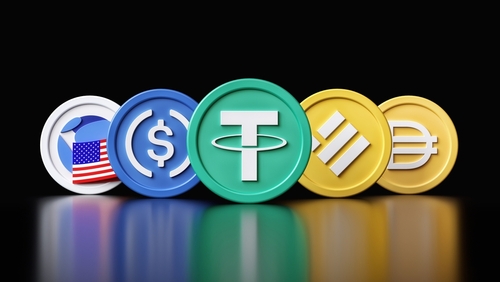
- Senate Democrats, led by Sen. Gallego, signaled opposition to advancing the current stablecoin (GENIUS Act) bill.
- Concerns stem from President Trump’s increasing personal financial ties to crypto ventures (memecoin, family-linked stablecoin).
- The legislative stall threatens not only the stablecoin bill but also progress on broader crypto market structure rules.
The path forward for landmark stablecoin legislation in the US Senate has hit a significant snag, as key Democratic lawmakers express reservations linked directly to President Donald Trump’s growing personal and financial connections within the cryptocurrency industry.
What was recently seen as a bipartisan effort now faces political headwinds, potentially delaying not only stablecoin rules but also broader market structure legislation for the digital asset sector.
Over the weekend, a group of nine Senate Democrats, led by Senator Ruben Gallego of Arizona, signaled they would oppose advancing the current version of the main stablecoin bill, known as the Guiding and Establishing National Innovation for US Stablecoins of 2025 (GENIUS Act).
Their unified stance raises immediate procedural hurdles, as Senate rules typically require 60 votes to overcome filibusters and move legislation forward. Gallego, notably elected with substantial backing ($10 million) from the crypto-focused super PAC Fairshake, now leads the charge expressing concerns.
While the senators’ public statement cited the need for stronger provisions on critical issues like anti-money laundering, national security, and consumer protection, sources suggest deeper concerns related to President Trump’s potential personal financial gains from the crypto space are driving the hesitation.
In a report, CoinDesk confirmed that Senate Minority Leader Chuck Schumer had privately urged Democrats to withhold support during a caucus meeting last week, predating Gallego’s public announcement. Axios first reported this internal division.
Trump’s crypto ventures raise red flags
Two recent developments appear to have particularly crystallized Democratic concerns. First, President Trump announced plans for a dinner exclusively for top holders of his own branded memecoin.
Second, Abu Dhabi investment firm MGX announced its intention to utilize USD1 – a stablecoin associated with World Liberty Financial, a firm backed by the Trump family – for a significant investment into the cryptocurrency exchange Binance.
As USA Today noted, these ventures suggest Trump could personally profit to the tune of hundreds of millions of dollars from activities potentially legitimized or facilitated by the proposed legislation.
President Trump, during a weekend interview on Meet the Press, denied seeking personal profit from his crypto initiatives.
“I’m not profiting from anything,” he asserted. “All I’m doing is, I started this long before the election. I want crypto. I think crypto’s important because if we don’t do it, China’s going to… But I want crypto because a lot of people, you know millions of people want it.”
Legislative momentum hits a wall
This emerging conflict threatens to derail the momentum not only for the stablecoin bill but also for much-anticipated market structure legislation.
Industry stakeholders have long sought clarity on how the Securities and Exchange Commission (SEC) and the Commodity Futures Trading Commission (CFTC) should oversee the broader digital asset market.
One individual working closely with lawmakers told CoinDesk that while the stablecoin bill might eventually pass, the current delay could jeopardize its progress, which in turn would almost certainly stall any movement on the more comprehensive market structure bill.
Concerns about the potential duration of this legislative slowdown and what concessions might be needed to appease Democrats are growing.
Senator Elizabeth Warren, a leading Democrat on the Senate Banking Committee and a prominent crypto skeptic, was unequivocal. Referring to the MGX deal involving the Trump family-linked stablecoin (publicly shared by Eric Trump), she posted on Bluesky that the Senate should reject any bill that would “facilitate this kind of corruption.”
Warren, along with Senator Jeffrey Merkley, subsequently sent a letter Monday urging the U.S. Office of Government Ethics to investigate the MGX transaction.
The resistance isn’t confined to the Senate. Representative Maxine Waters, the top Democrat on the House Financial Services Committee, informed the committee’s chair on Monday that she would block efforts to hold a joint hearing with the House Agriculture Committee aimed at addressing market structure legislation.
Politics vs. policy: industry urges action
Financial policy analyst Jaret Seiberg of TD Cowen characterized much of the current impasse as “politics.”
In a note to clients, he observed that Trump’s personal stake makes it politically difficult for Democrats to support legislation regulating his family’s interests.
Despite this, Seiberg predicts the stablecoin bill will likely still pass the Senate eventually, albeit perhaps not this week, given the crypto industry’s significant lobbying power and resources.
“It is hard for us to see why the Democrats would take on that fight when they can leverage significant concessions from the GOP on the stablecoin bill,” he reasoned.
The crypto industry itself appears alarmed by the sudden halt in momentum.
A joint statement released Monday by leaders of the Blockchain Association, the Crypto Council for Innovation, and the Digital Chamber urged Senators to proceed with debate on the GENIUS Act, arguing a clear regulatory framework is vital for stablecoin adoption and maintaining “dollar dominance in the digital economy.”
The National Venture Capital Association echoed this call, emphasizing the need for clear rules to foster innovation and support US leadership in financial technology.
While the senators withholding support stated they “recognize that the absence of regulation leaves consumers unprotected,” their current stance, driven by concerns over presidential conflicts of interest, has undeniably pumped the brakes on crypto legislation in Washington.
Leave a Comment